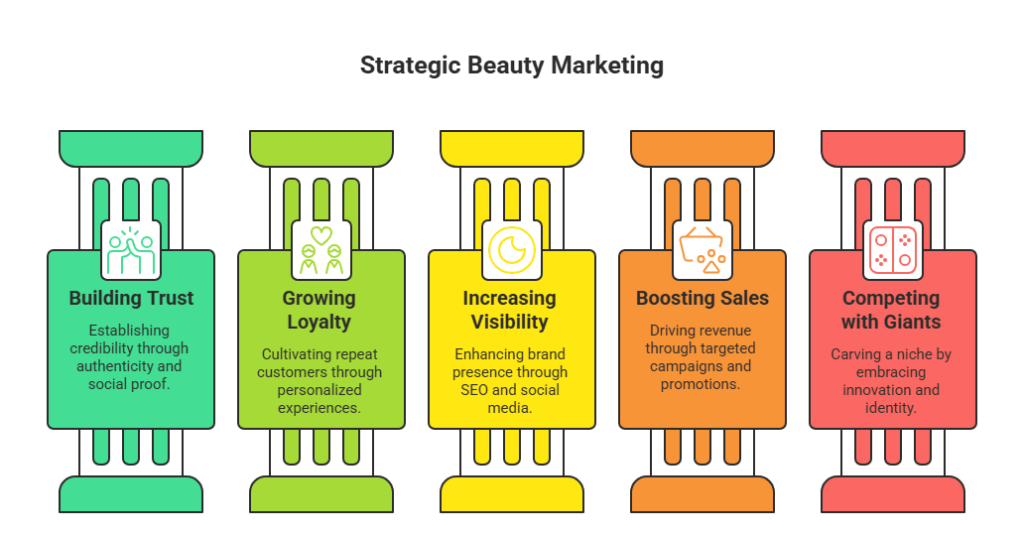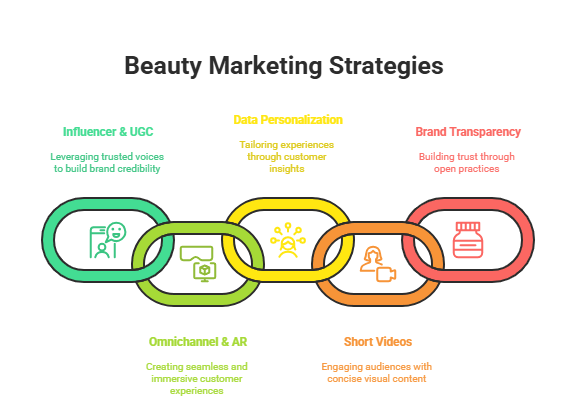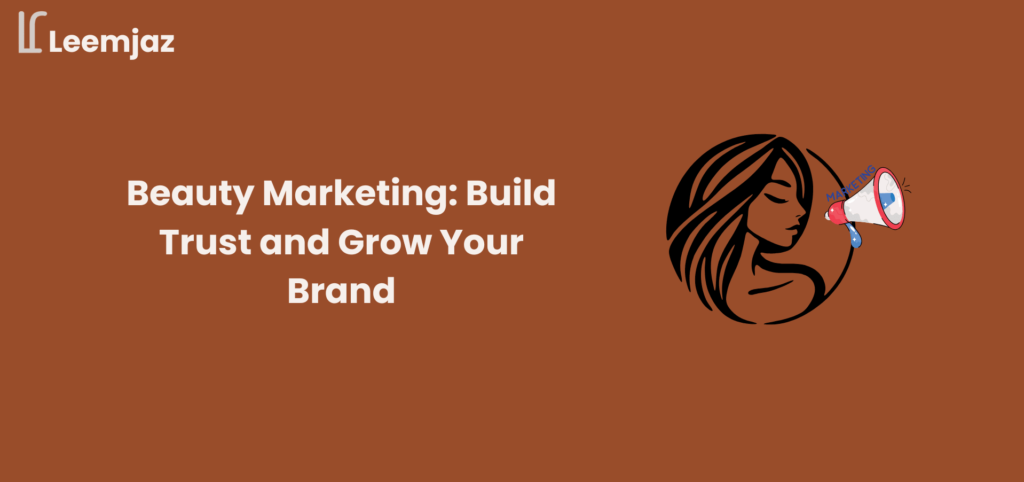Beauty marketing is more than just photos and influencer posts. It’s a plan that helps you build trust, boost sales, and keep customers loyal. With so many beauty brands out there, having a clear marketing plan helps your business stand out and grow over time.
This article will show you easy ways to promote your beauty brand. From reaching the right people to using the best platforms, these steps will help your brand grow without wasting time or money.
Why Beauty Marketing is Important for New Brands

There are so many choices in the beauty industry, which makes marketing essential. Here’s why it matters:
- Build Trust: Make people believe in your brand.
- Grow Loyal Customers: Keep customers coming back for more.
- Increase Visibility: Get your brand seen on Google and social media.
- Boost Sales: Use smart campaigns to increase sales.
- Compete with Bigger Brands: You don’t need a huge budget to beat larger brands.
Without marketing, even the best products may go unnoticed.
Top Beauty Marketing Strategies

- Influencers and User-Generated Content (UGC)
Working with influencers, especially smaller ones, can help build trust. User-generated content like reviews, unboxing videos, and customer posts are great ways to show how your product works. Instagram and TikTok are perfect platforms for this.
Tip: Build long-term relationships with influencers instead of one-time deals for better results. - Omnichannel & AR Experiences
Beauty shoppers expect to find your brand across all channels—website, social media, and even in-store. Offering a smooth experience everywhere helps build trust. Augmented Reality (AR) tools, like virtual try-ons, also make customers feel more confident and reduce returns.
Example: L’Oréal used AR tools to let customers try makeup virtually, which made them more likely to buy. - Personalization Using Data
Use tools to track customer preferences and give them personalized product recommendations. AI chatbots, automatic emails, and product quizzes can help keep people engaged and encourage repeat purchases.
Example: CeraVe grew by working with TikTok influencers to explain their products in simple ways. - Short Videos and Content
Short videos, like tutorials and quick demos, keep customers excited and help them make decisions. Instagram Reels, TikToks, and YouTube Shorts are great for this.
Tip: Use video to show how your products work and excite potential buyers. - Be Transparent About Your Brand and Pricing
Consumers appreciate honesty. Be clear about your ingredients, pricing, and how products are made. Sharing your brand’s story helps people connect with you.
Step-by-Step Guide: From Launch to Growth

- Know Your Audience & Messaging
Understand who your ideal customers are. Think about their age, lifestyle, and habits. Then create a message that speaks to their needs and wants.
Tip: Use surveys or social media to learn more about your audience. - Build a Strong Website, SEO, and Content
Your website should be fast, mobile-friendly, and easy to navigate. It should include:- Clear product descriptions with helpful keywords.
- Blog posts that answer common questions.
- Videos showing how your products work.
- Easy checkout and clear calls-to-action.
Make sure your content answers what customers are looking for.
- Clear product descriptions with helpful keywords.
- Start Marketing Campaigns
Begin with affordable influencer partnerships and share real customer content. Promote on:- Instagram Reels
- TikTok
- Facebook Ads
- Email campaigns with AR links
Tip: Keep influencer partnerships authentic to build trust.
- Instagram Reels
- Measure and Improve
Track your results to see what’s working. Use tools like:- Google Analytics to check website traffic.
- Hotjar to see how people interact with your site.
- A/B testing on landing pages to see which version performs better.
Look at your key performance indicators (KPIs) like conversion rates and ad performance to check if your marketing is working.
- Google Analytics to check website traffic.
- Grow Your Brand
Once you see success, expand by offering things like:- Subscription boxes or loyalty programs.
- Building a community on Facebook or Discord.
- Hosting online events or pop-up shops.
- Tip: Launch limited-edition products or support a cause to create more buzz.
Examples of Successful Beauty Brands
- CeraVe
CeraVe grew by using science-based messaging and teaming up with TikTok influencers who explained their products simply. - L’Oréal’s AR Try-On Tool
L’Oréal’s AR tools let customers try makeup online, making them more confident about buying. - Glossier’s Community Focus
Glossier grew by connecting with customers directly and turning them into brand supporters.
Measuring Success: KPIs to Track

To see how well your beauty marketing is working, keep track of these numbers:
- Conversion Rate: Are people buying your products?
- Customer Lifetime Value (CLV): How much is a loyal customer worth over time?
- Engagement Rate: Are people interacting with your posts?
- Return on Ad Spend (ROAS): Are your ads working?
- Churn Rate: Are customers leaving and not coming back?
Use analytics tools to keep track of these metrics.
Avoid These Common Mistakes
- Relying Too Much on One Channel: Don’t just use Instagram or TikTok. Try other platforms too.
- Ignoring SEO: Organic search traffic is important for growth.
- Not Personalizing Enough: Tailor your offers and messages to customers.
- Only Focusing on Looks: Customers care more about your message than fancy packaging.
- Not Getting Feedback: Use reviews and surveys to improve your products and service.
How Leemjaz Can Help You With Beauty Marketing
At Leemjaz, we specialize in helping beauty brands grow by creating personalized and effective marketing strategies. Whether you’re just starting or looking to enhance your current marketing efforts, we offer:
- Customized marketing plans that align with your brand’s goals.
- SEO optimization for your website and content to improve visibility.
- Targeted advertising campaigns across platforms like Instagram, TikTok, and Google Ads.
- Influencer marketing strategies to help you build relationships with the right influencers.
Visit Leemjaz.com to learn more about how we can help you take your beauty brand to the next level.
Conclusion
Beauty marketing is about providing value, building trust, and connecting with your customers. Follow the steps in this guide to help your beauty brand succeed long-term. Start by understanding your audience and offering something special. Use data to make informed decisions and build real connections. With the right strategy, your beauty brand can grow and stand out in a crowded market.
